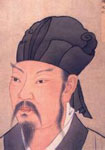“劍化會相從”的意思及全詩出處和翻譯賞析
“劍化會相從”全詩
高居朝圣主,厚德載群生。
武帳虛中禁,玄堂掩太平。
秋天笳鼓歇,松柏遍山鳴。
威儀備吉兇,文物雜軍容。
配地行新祭,因山托故封。
鳳飛終不返,劍化會相從。
無復臨長樂,空聞報曉鐘。
追攀萬國來,警衛百神陪。
畫翣登秋殿,容衣入夜臺。
云隨仙馭遠,風助圣情哀。
只有朝陵日,妝奩一暫開。
作者簡介(韓愈)

韓愈(768~824)字退之,唐代文學家、哲學家、思想家,河陽(今河南省焦作孟州市)人,漢族。祖籍河北昌黎,世稱韓昌黎。晚年任吏部侍郎,又稱韓吏部。謚號“文”,又稱韓文公。他與柳宗元同為唐代古文運動的倡導者,主張學習先秦兩漢的散文語言,破駢為散,擴大文言文的表達功能。宋代蘇軾稱他“文起八代之衰”,明人推他為唐宋八大家之首,與柳宗元并稱“韓柳”,有“文章巨公”和“百代文宗”之名,作品都收在《昌黎先生集》里。韓愈在思想上是中國“道統”觀念的確立者,是尊儒反佛的里程碑式人物。
《大行皇太后挽歌詞三首》韓愈 翻譯、賞析和詩意
《大行皇太后挽歌詞三首》是韓愈在唐代創作的一首詩詞。以下是我為您提供的中文譯文以及對該詩詞的詩意和賞析:
詩詞中文譯文:
一紀尊名正,三時孝養榮。
高居朝圣主,厚德載群生。
武帳虛中禁,玄堂掩太平。
秋天笳鼓歇,松柏遍山鳴。
威儀備吉兇,文物雜軍容。
配地行新祭,因山托故封。
鳳飛終不返,劍化會相從。
無復臨長樂,空聞報曉鐘。
追攀萬國來,警衛百神陪。
畫翣登秋殿,容衣入夜臺。
云隨仙馭遠,風助圣情哀。
只有朝陵日,妝奩一暫開。
詩意和賞析:
這首詩詞是韓愈為了表達對已故的皇太后的悼念之情而創作的。詩中表達了對皇太后一生的贊美和懷念。
首先,詩詞提到皇太后在一生中享有崇高的聲望,她的孝養之德在三代中都受到了榮耀的贊揚。她高位居于朝廷,成為崇高的統治者,以她的厚德滋養著萬民。
接著,詩中描繪了皇太后的離世給大殿帶來了悲痛的氛圍。武帳空虛,玄堂寂靜,笳鼓聲在秋天停止,松柏樹在山中哀鳴。這些描寫營造了一種莊嚴肅穆的氣氛,以表達對皇太后的深切哀思。
詩中還提到皇太后莊嚴的儀態,她的文物和軍容雜亂無章地擺放在一起。她的行為和儀態不僅體現了她的威嚴,而且也是對她的尊敬和紀念。
詩詞的結尾描述了皇太后的去世對整個國家和人民的影響。她的去世象征著鳳凰不再歸來,劍化為親人的陪伴。再也沒有人能夠在長樂宮中見到她的身影,只能聽到黎明時分的鐘聲報告著新的一天的到來。人們紛紛追憶她的輝煌,守護百神的安寧。
最后幾句描寫了畫像和容貌,皇太后的形象仿佛登上秋殿,她的衣裝和妝容也仿佛進入了夜晚的臺階。云隨著仙人的駕馭而遠去,風助長眠者的悲傷。只有在朝陵之日,她的妝奩才會暫時打開。
這首詩詞通過對皇太后的贊美和懷念,表達了作者對她的敬仰和感激之情,同時也展現了對逝去的人的思念和對生命的短暫的感The following is a translation and analysis of the poem "Three Laments for the Late Empress Dowager" by Han Yu, a poet from the Tang dynasty:
Poem Translation:
In a single era, esteemed and righteous,
Three times honored for filial devotion.
She resided high as the sacred ruler,
Her abundant virtue benefiting all.
Within the empty military tent, prohibitions held,
The mysterious hall concealed tranquility.
Autumn's flute and drum cease their sound,
Pines and cypresses throughout the mountains mourn.
Her dignified presence accommodated both auspicious and ominous occasions,
Cultural artifacts mingled with military appearance.
To the land, she performed new rituals,
Upon the mountains, she entrusted ancestral tombs.
The phoenix flies, never to return,
Swords transform, meeting in the afterlife.
No longer present in the palace of eternal joy,
Only the sound of the morning bell is heard.
She pursued the arrival of countless nations,
Guarded by a hundred deities.
Her painted likeness ascends the autumn hall,
Her ceremonial garments enter the nightly platform.
Clouds follow the immortal carriage, distant and ethereal,
The wind assists the lamentable sentiment of the holy.
Only on the day of the imperial tomb's opening,
Will the bridal chamber be briefly unveiled.
Poetic Meaning and Analysis:
This poem, "Three Laments for the Late Empress Dowager," was composed by Han Yu to express his grief and admiration for the deceased Empress Dowager. It praises her accomplishments and reflects on her life.
Firstly, the poem mentions the Empress Dowager's esteemed reputation throughout her lifetime. Her filial piety was honored and respected for three generations. She held a high position as the ruler in the imperial court, and her virtuous conduct benefited the people.
The poem then portrays the solemn atmosphere that follows the Empress Dowager's passing. The military tent stands empty, and the mysterious hall conceals tranquility. The sounds of autumn's flute and drum cease, while the pines and cypresses throughout the mountains mourn. These descriptions create a sense of solemnity and grief, reflecting the poet's deep sorrow for the Empress Dowager's departure.
The poem also highlights the Empress Dowager's dignified demeanor. Her cultural artifacts and military regalia are intermingled, demonstrating her authority and reverence.
Furthermore, the poem describes the impact of the Empress Dowager's death on the nation and its people. Her passing signifies the phoenix's flight, never to return, and swords transforming to meet in the afterlife. She will no longer be present in the palace of eternal joy, but her memory lingers through the tolling of the morning bell. People recall her magnificence, and she is guarded by a hundred deities.
The final lines depict her portrait and appearance. The Empress Dowager's likeness ascends the autumn hall, and her ceremonial garments enter the nightly platform. Clouds follow her immortal carriage, symbolizing her distant and ethereal existence, while the wind intensifies the mournful sentiment of the holy. Only on the day of the imperial tomb's opening will her bridal chamber be briefly unveiled.
Through this poem, Han Yu expresses his admiration and gratitude for the Empress Dowager, as well as his longing and reflection upon the passing of a loved one. The transient nature of life and the eternal remembrance of the departed are recurring themes in this elegy.
“劍化會相從”全詩拼音讀音對照參考
dà xíng huáng tài hòu wǎn gē cí sān shǒu
大行皇太后挽歌詞三首
yī jì zūn míng zhèng, sān shí xiào yǎng róng.
一紀尊名正,三時孝養榮。
gāo jū cháo shèng zhǔ, hòu dé zài qún shēng.
高居朝圣主,厚德載群生。
wǔ zhàng xū zhōng jìn, xuán táng yǎn tài píng.
武帳虛中禁,玄堂掩太平。
qiū tiān jiā gǔ xiē, sōng bǎi biàn shān míng.
秋天笳鼓歇,松柏遍山鳴。
wēi yí bèi jí xiōng, wén wù zá jūn róng.
威儀備吉兇,文物雜軍容。
pèi dì xíng xīn jì, yīn shān tuō gù fēng.
配地行新祭,因山托故封。
fèng fēi zhōng bù fǎn, jiàn huà huì xiāng cóng.
鳳飛終不返,劍化會相從。
wú fù lín cháng lè, kōng wén bào xiǎo zhōng.
無復臨長樂,空聞報曉鐘。
zhuī pān wàn guó lái, jǐng wèi bǎi shén péi.
追攀萬國來,警衛百神陪。
huà shà dēng qiū diàn, róng yī rù yè tái.
畫翣登秋殿,容衣入夜臺。
yún suí xiān yù yuǎn, fēng zhù shèng qíng āi.
云隨仙馭遠,風助圣情哀。
zhǐ yǒu zhāo líng rì, zhuāng lián yī zàn kāi.
只有朝陵日,妝奩一暫開。
“劍化會相從”平仄韻腳
平仄:仄仄仄平平
韻腳:(平韻) 上平二冬 (仄韻) 去聲二宋 * 平仄拼音來自網絡,僅供參考;詩句韻腳有多個的時候,對比全詩即可判斷。